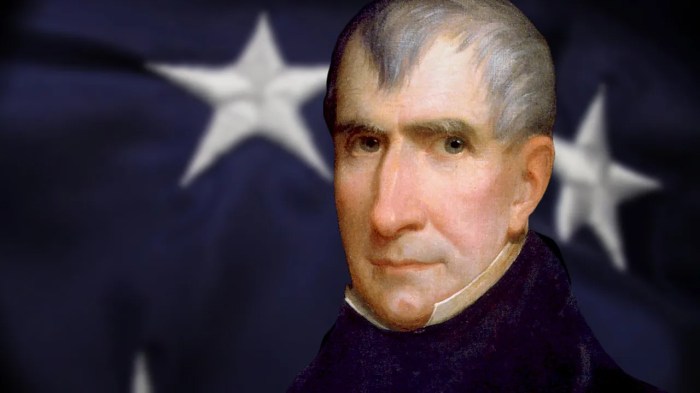Forget everything you thought you knew about presidents! William Henry Harrison, the ninth president of the United States, was a man of action, a military hero, and a politician who was as comfortable on the battlefield as he was in the halls of Congress.
This biography takes you on a wild ride through Harrison’s life, from his humble beginnings in Virginia to his meteoric rise to power, and ultimately, his tragic downfall. Get ready to dive into the story of a man who was both a product of his time and a force to be reckoned with.
This biography delves into Harrison’s military career, highlighting his key victories and his role in shaping the American frontier. It explores his political rise through the ranks, his presidential campaign, and the whirlwind of his short but impactful presidency. But it’s not just about the facts, it’s about the man behind the myth.
We’ll explore Harrison’s personality, his beliefs, and the challenges he faced, both personal and political.
Early Life and Family
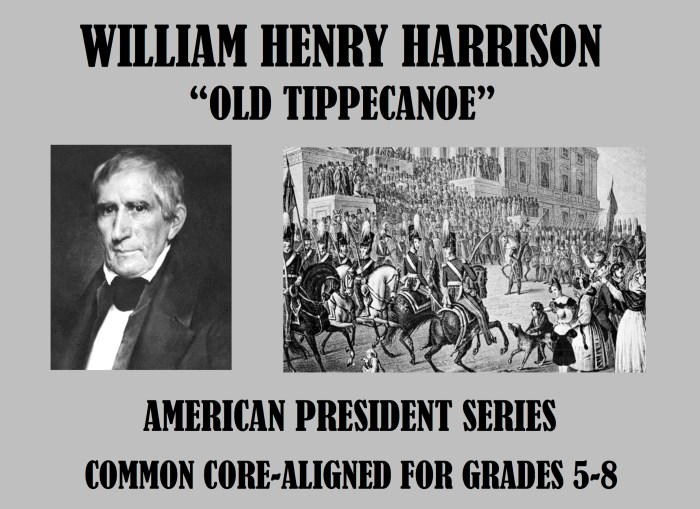
William Henry Harrison, the ninth president of the United States, was born into a prominent Virginia family steeped in history and political tradition. His early life was shaped by the values and expectations of his family, setting the stage for a career in public service that would eventually lead him to the White House.
Childhood and Upbringing
William Henry Harrison was born on February 9, 1773, at Berkeley Plantation in Charles City County, Virginia. The plantation, a sprawling estate on the James River, was a symbol of the wealth and influence of the Harrison family. William’s childhood was one of privilege and opportunity, but also one of responsibility.
He was expected to learn the skills of a gentleman, including horsemanship, hunting, and the art of conversation. He also received a formal education, studying Latin, Greek, and mathematics under the tutelage of private tutors.
Family Background
William Henry Harrison’s family was deeply rooted in the history of Virginia and the American colonies. His father, Benjamin Harrison V, was a prominent lawyer, planter, and politician who served as governor of Virginia during the American Revolutionary War. Benjamin Harrison V was a strong advocate for independence from Great Britain, and his leadership helped to secure Virginia’s role in the fight for freedom.William’s mother, Elizabeth Bassett Harrison, was the daughter of a wealthy planter and a member of a prominent Virginia family.
She was known for her intelligence, strength of character, and devotion to her family. William had six siblings, including two brothers who would also pursue careers in politics.
Notable Ancestors
William Henry Harrison’s family tree included a number of notable figures in American history. His grandfather, Benjamin Harrison IV, was a member of the House of Burgesses and a signer of the Declaration of Independence. His great-grandfather, Benjamin Harrison III, was a member of the Virginia Council and a prominent figure in the colony’s early development.
Education and Family Traditions
William Henry Harrison’s education was largely shaped by the traditions of his family. He received a classical education, studying Latin, Greek, and mathematics, which was considered essential for gentlemen of his time. His family also instilled in him a strong sense of duty, honor, and public service.
These values would guide his actions throughout his life, from his military career to his political service.
Military Career and Rise to Prominence
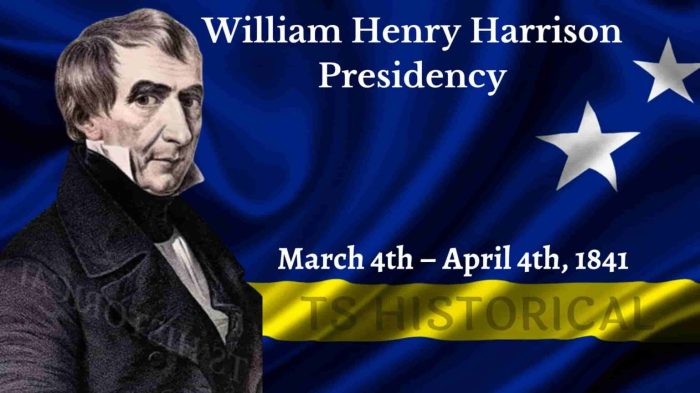
William Henry Harrison’s military career began long before his presidency, shaping him into a respected figure in the American West and playing a crucial role in his political ascent. The War of 1812 provided him with the opportunity to prove his mettle as a military leader and solidify his place as a national hero.
Harrison’s Military Service in the War of 1812
Harrison’s military service during the War of 1812 was marked by a series of significant campaigns and victories. As a brigadier general in the U.S. Army, he played a vital role in securing the American frontier against British and Native American forces.
Key Battles and Victories
Harrison’s most notable achievement during the War of 1812 was his victory at the Battle of Tippecanoe. This decisive battle, fought on November 7, 1811, against a confederation of Native American tribes led by Tecumseh, proved to be a turning point in the war.
The battle, fought near the present-day city of Lafayette, Indiana, solidified Harrison’s reputation as a skilled military leader and earned him the nickname “Tippecanoe.”
- Battle of Tippecanoe (November 7, 1811):This battle was a decisive victory for Harrison, leading to the defeat of Tecumseh’s confederation and securing the American frontier in the Northwest. Harrison’s leadership and strategic brilliance were evident in his planning and execution of the battle, which earned him widespread recognition.
- Battle of Thames (October 5, 1813):Harrison played a key role in the Battle of the Thames, which resulted in the death of Tecumseh and effectively ended the British-Native American alliance in the Northwest. The victory further solidified Harrison’s military reputation and strengthened his political standing.
So, you’re digging into the life and times of William Henry Harrison, huh? That dude was a wild card, a true American patriot, and the shortest-serving president ever. The guy was a total badass, even if he only lasted a month in office.
Reading about history can be a real mind-bender, so if you need to chill out after all that political drama, grab a Mini Boho Coloring Book and let your inner artist run wild. You’ll be back to the good ol’ days of William Henry Harrison in no time!
- Other Campaigns:Harrison also led campaigns in the Ohio Valley and the Great Lakes region, successfully defending American territory against British and Native American forces. His military experience and leadership during these campaigns contributed significantly to the American victory in the War of 1812.
William Henry Harrison’s political biography is a fascinating read, exploring his rise from a military hero to the White House. But even the most hardcore history buffs need a break sometimes! If you’re looking for a way to unwind and unleash your inner artist, check out Cute Fairies Coloring Book For Adults And Teens 50 Beautiful Flower Fairies Illustrations for Relaxation and Stress Relief…Gift For Adults Teens Girls.Paperback – February 16 2023.
It’s packed with adorable fairy illustrations perfect for coloring and de-stressing, and will help you come back to those historical tomes feeling refreshed and ready to tackle the next chapter of Harrison’s life.
Harrison’s Rise to Prominence
Harrison’s military achievements, particularly his victory at Tippecanoe, catapulted him to national prominence. His success in the War of 1812, coupled with his reputation as a skilled military leader and a strong advocate for westward expansion, made him a popular figure in the emerging American West.
Yo, wanna know more about William Henry Harrison, the dude who was President for, like, a hot minute? He’s got a pretty wild story, man! Check out Download And Listen Here to get the lowdown on his political journey, from his early days in the military to his brief but impactful presidency.
It’s like a historical drama, but way more real!
Shaping the Frontier
Harrison’s military service and his role in the War of 1812 had a profound impact on the shaping of the American frontier. His victories against Native American forces helped to secure American control over vast territories in the Northwest, paving the way for westward expansion and settlement.
- Treaty of Fort Wayne (1809):Harrison played a key role in negotiating this treaty, which ceded large tracts of land to the United States from Native American tribes in the Northwest. This treaty was a significant step in the westward expansion of the United States, and Harrison’s involvement solidified his reputation as a skilled negotiator and a champion of American interests.
- Military Governorships:Harrison’s military service and his role in the War of 1812 led to his appointment as Governor of the Indiana Territory (1800-1812) and Governor of the Northwest Territory (1803-1812). In these roles, he was instrumental in shaping the development of the frontier, promoting westward expansion, and establishing a strong American presence in the region.
- Land Speculation:Harrison was also actively involved in land speculation, acquiring large tracts of land in the Northwest. This involvement, though controversial, further solidified his connection to the frontier and his commitment to its development.
Political Career and Presidency
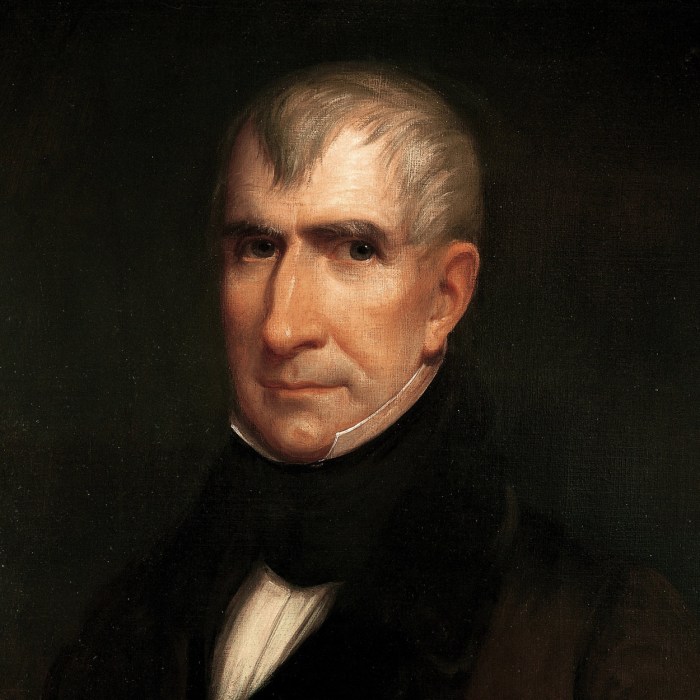
William Henry Harrison’s political career was a testament to his dedication to public service and his ability to connect with the common man. While his military career brought him fame, his political journey showcased his understanding of the issues that resonated with the American people.
Harrison’s Political Career
Harrison’s political career began with his election to the U.S. Senate in 1824, representing Ohio. He quickly became a prominent figure in the Whig Party, a political group that emerged in opposition to President Andrew Jackson’s Democratic Party. The Whigs favored a strong national government, supported economic development, and opposed Jackson’s expansionist policies.
Harrison’s Presidential Campaign in 1840
Harrison’s presidential campaign in 1840 was a turning point in American political history. He was chosen as the Whig candidate, and his campaign was a masterclass in political strategy and public relations. The Whigs cleverly positioned Harrison as a “man of the people,” a humble log cabin dweller who understood the struggles of ordinary Americans.
This strategy, known as the “Log Cabin Campaign,” resonated with voters, especially those who felt alienated by the perceived elitism of President Martin Van Buren.
The Log Cabin Campaign
The Log Cabin Campaign was a strategic masterpiece that capitalized on the popular appeal of Harrison’s humble origins. The Whigs used imagery of log cabins and hard cider, symbols of rural life and self-reliance, to portray Harrison as a man of the people.
They held massive rallies and parades, using catchy slogans and songs to spread their message.
“Tippecanoe and Tyler Too!”
This slogan, referencing Harrison’s victory at the Battle of Tippecanoe and his running mate John Tyler, became a rallying cry for the Whigs. The campaign was a massive success, and Harrison won a landslide victory, defeating Van Buren in the election.
Harrison’s Presidency
Harrison’s presidency was tragically short-lived. He served only 31 days before succumbing to pneumonia, the shortest presidency in American history.
Harrison’s Inaugural Address
Harrison’s inaugural address, delivered on March 4, 1841, was a long and rambling speech that lasted for nearly two hours. He spoke of the importance of limited government, individual liberty, and economic growth. He also emphasized the need for a strong national defense and a balanced budget.
“The general government is but a means to an end. Its powers are limited and defined. Its object is the welfare of the people.”
This quote from his inaugural address encapsulates Harrison’s belief in the importance of a government that served the needs of the people, not the other way around.
Challenges Faced During Harrison’s Presidency
Despite his short tenure, Harrison faced several challenges during his presidency. The most pressing was the economic crisis that had begun during Van Buren’s presidency. The Panic of 1837 had led to widespread unemployment, bank failures, and a decline in agricultural prices.
Harrison and his Whig colleagues sought to address the crisis through policies that promoted economic growth and stability.
Legacy and Impact
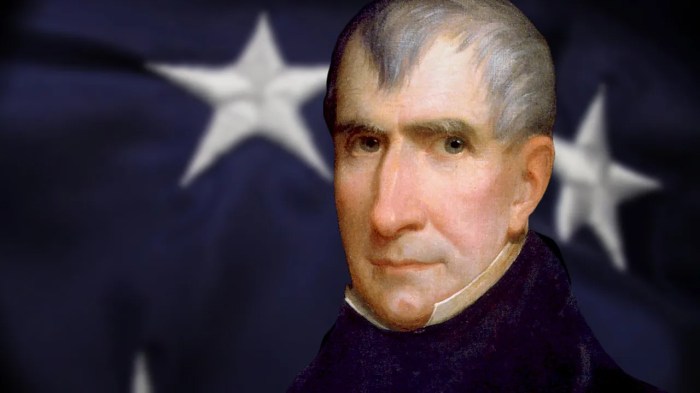
William Henry Harrison’s legacy is a complex one, marked by both the brevity of his presidency and his lasting impact on American history. While he is often remembered as the shortest-serving president, his influence on the development of the West and his status as a military hero continue to resonate in American culture.
Contributions to Western Expansion
Harrison’s contributions to the development of the West are significant, stemming from his role as a military leader and his political beliefs. His military campaigns against Native American tribes in the Northwest Territory helped to secure the land for American expansion.
His political views, which favored westward expansion and the acquisition of new territories, played a crucial role in shaping the nation’s westward movement.
Book Review
William Henry Harrison, the ninth president of the United States, is often remembered for his brief tenure in office, succumbing to illness just a month after his inauguration. However, his life was far more than a footnote in American history.
This biography delves into the multifaceted career of a man who was a military hero, a politician, and a representative of his era’s changing political landscape.
The Author’s Perspective and Sources
The author’s perspective is one of deep admiration for Harrison’s accomplishments, but also acknowledges his flaws and limitations. The biography avoids hagiography, presenting a balanced and nuanced portrait of the man. The author’s approach is evident in the careful selection and use of both primary and secondary sources.
Primary sources, such as Harrison’s personal letters and diaries, provide intimate glimpses into his thoughts and motivations. Secondary sources, including contemporary accounts and historical analyses, offer broader context and perspectives on his life and career. This meticulous approach ensures that the biography is well-researched and historically accurate.
William Henry Harrison, the ninth President of the United States, was a man of action, leading his troops in the War of 1812 and advocating for a strong national government. But beyond politics, he was a man of the land, owning a sprawling plantation in Ohio.
Perhaps he would have appreciated the modern-day approach to sustainable living, like rainwater harvesting. Check out this guide for a step-by-step plan on how to save money and create a clean, sustainable water supply for your home and garden: Rainwater Harvesting For Your Homestead A Step by Step Plan to Save Money Using a Clean and Sustainable Water Supply for Your Garden Livestock and Home.
Harrison’s legacy, like the practice of rainwater harvesting, is all about resourcefulness and making the most of what you have.
Strengths and Weaknesses of the Biography
- The biography’s greatest strength is its thoroughness. It covers Harrison’s life from his early years to his presidency, providing detailed accounts of his military campaigns, political career, and personal life. The author’s extensive research is evident in the rich tapestry of detail woven into the narrative.
- Another strength lies in the author’s ability to contextualize Harrison’s life within the broader historical landscape. The biography skillfully connects Harrison’s experiences to the major events and trends of his time, such as the American Revolution, the War of 1812, and the rise of political parties.
- However, the biography could benefit from more analysis of Harrison’s political beliefs and their impact on his decisions. While the book details his political career, it does not delve deeply into his ideological underpinnings. This would provide a more complete understanding of Harrison’s motivations and actions.
- The biography’s weakness lies in its lack of attention to Harrison’s personal relationships. While it mentions his family and close associates, it does not explore the dynamics of these relationships in detail. This omission leaves a gap in the understanding of Harrison as a human being, beyond his public persona.
The Biography’s Contribution to Understanding Harrison
This biography offers a valuable contribution to the understanding of William Henry Harrison. It presents a comprehensive and well-researched account of his life, shedding light on his accomplishments, challenges, and the complexities of his character. The author’s balanced approach and use of primary sources provide a rich and insightful portrait of a pivotal figure in American history.
Epilogue
William Henry Harrison’s story is one of ambition, achievement, and ultimately, a tragic twist of fate. He left a legacy as a military hero and a political figure who shaped the course of American history. But his brief presidency, cut short by illness, serves as a reminder that even the most powerful leaders are not immune to the unpredictable nature of life.
This biography explores the complexities of Harrison’s life, offering a glimpse into the man behind the myth and a deeper understanding of his lasting impact on American history.
Expert Answers
What is William Henry Harrison best known for?
He’s known for his military victories, particularly the Battle of Tippecanoe, and his short presidency, which was marked by his famous inaugural address and his death just a month after taking office.
What was the “Log Cabin Campaign” and how did it relate to William Henry Harrison?
The “Log Cabin Campaign” was the nickname for Harrison’s 1840 presidential campaign. It was based on the idea of portraying him as a simple, humble man from the frontier, living in a log cabin. This image resonated with voters, and helped Harrison win the election.
What was William Henry Harrison’s cause of death?
He died from pneumonia, which he likely contracted during his long inaugural address delivered in freezing weather.
How did William Henry Harrison’s presidency impact the United States?
His presidency was very short, so his direct impact was limited. However, his death during his first month in office contributed to a sense of instability and uncertainty within the government. It also highlighted the dangers of the presidency, and led to calls for changes in the way presidents were elected and the length of their terms.

